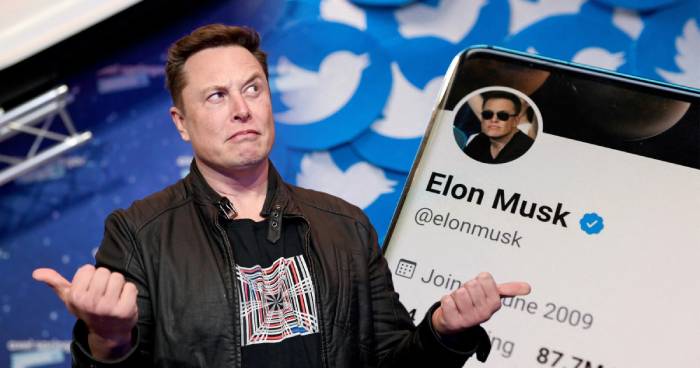Elon Musk has decided to put his offer to buy Twitter (TWTR) on hold, only weeks after agreeing to buy the firm for $44 billion.
Musk tweeted on Friday, “Twitter deal temporarily on hold pending details supporting calculation that spam/fake accounts do indeed represent less than 5% of users.”
Twitter’s stock dropped more than 13% in premarket trade following the news.
Musk linked to a Reuters piece from May 2 on Twitter’s most recent disclosure about its spam and fake account problem in his tweet.
Twitter claimed that bogus or spam accounts made up less than 5% of the platform’s active users during the first three months of the year in its quarterly financial report, issued on April 28. The figures were based on a survey of sample accounts, and Twitter thought the statistics were “reasonable.”
However, it admitted that the figures were not independently verified, and that the true number of fake or spam accounts could be greater.
For years, Twitter has struggled with spam, and the company has repeatedly stated that decreasing bogus and malicious accounts is critical to its capacity to continue expanding. It’s unclear why Musk would back out of the deal following the latest discovery.
A ‘circus’
In an early Friday note to clients, tech analyst Dan Ives of Wedbush Securities said that Musk had turned “this Twitter circus show into a Friday the 13th horror show.”
If Musk cancels the deal, he will owe Twitter a $1 billion breakup fee.
“The Street will view this deal as 1) likely falling apart, 2) Musk negotiating for a lower deal price, or 3) Musk simply walking away from the deal with a $1 billion breakup fee,” Ives wrote. “Many will view this as Musk using this Twitter filing/spam accounts as a way to get out of this deal in a vastly changing market.”
Since Musk and Twitter agreed to buy the company roughly three weeks ago, stocks have been substantially lower, particularly in the IT sector.
Skepticism from the start
Since Twitter’s board agreed to the bid on April 26, pessimism about whether the deal would go through has been circling even as Musk worked to arrange finance for the takeover.
Musk said that he would purchase Twitter for $54.20 per share. However, Twitter’s stock never got close to that level, hovering around $50 for weeks. That was a warning that investors doubted Musk would follow through on his offer.
Wall Street analysts were also suspicious of Musk’s ability to purchase Twitter at $54.20 per share. The consensus target price was below $52, and the vast majority of analysts gave the stock a “hold” rating.
The fact that Twitter is linked to Tesla’s (TSLA) fate has been part of the issue. Musk, Tesla’s CEO, had planned to finance the transaction by borrowing against a portion of his Tesla stock, but Tesla’s stock has been falling along with most other equities this year.
Musk’s sale of a large number of Tesla shares to help finance his Twitter deal put the carmaker’s stock under pressure. He didn’t have much of a cushion left after committing a large portion of his Tesla shares elsewhere, so he didn’t have much to fall back on if he needed more cash to complete the Twitter takeover.
Tesla (TSLA) shares soared 6% higher in premarket trading Friday, according to Ives, after the Twitter acquisition was announced.
“The overhang [for Tesla shares] created by this deal has turned into a life of its own,” he wrote.
Tesla, the world’s most valuable automaker, has lost about a third of its value since Musk announced his investment in Twitter.
Musk was using his Tesla shares as collateral to acquire cash for the Twitter purchase, in addition to selling $8.5 billion of his Tesla stock last month, or around 6% of his total holdings. However, the reduction in the value of Tesla shares has cast doubt on his ability to complete the financing of the Twitter deal.
Musk’s Twitter strategy
Musk had given few specifics about his plans for the social media company, but he had previously spoken out against bot accounts that spread spam. He also claims that the corporation has been too quick to deactivate accounts that have broken its content-moderation rules.
Musk made waves on Tuesday when he said that after the acquisition was complete, he would let former President Donald Trump to return to Twitter. After his supporters attacked the US Capitol on January 6, 2021, Trump’s account was permanently deleted.
Twitter revealed earlier this week that it is delaying most hiring and backfilling, with the exception of “business critical” roles, and cutting non-labor costs. It also disclosed the departure of two top executives, general manager of consumer Kayvon Beykpour and revenue product lead Bruce Falck.
The Wall Street Journal reported on Thursday that the Securities and Exchange Commission and the Federal Trade Commission were both investigating Musk’s earlier this year purchases of Twitter and whether he properly disclosed them.
- March Madness 2025: Printable Bracket, Game Schedule & How to Watch - March 13, 2025
- March Madness Miracles: Worst Records to Get an NCAA Tournament Bid - March 13, 2025
- NCAA DI Wrestling Championships 2025: How to Watch, Brackets & Selection Info - March 13, 2025



